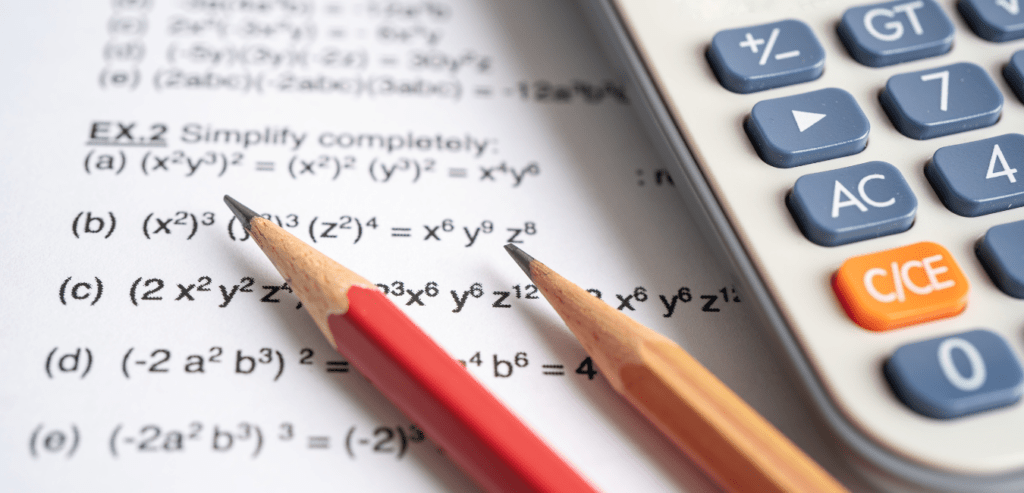Whether you are about to enter into your senior years or you are already in the midst of its chaos, we’ve put together an all-in-one guide for HSC Standard Maths for you to use!
From ensuring that you have covered all your past topics before the next exam or you are anticipating what the next two years may bring. We have you covered.
Let’s dive right in!
Prerequisites for Standard Maths
Introduction to Standard Maths
Algebra
Measurement
Financial Maths
Statistical Analysis
Networks
Prerequisites for HSC Standard Maths
Standard Maths is a 2-unit course that builds on mathematical concepts and problem-solving skills you have learned in Years 9 and 10.
Thus, it is good to revise and ensure you have a good understanding of the following topics:
- Area and Surface Area
- Financial Mathematics
- Linear Relationships
- Non-Linear Relationships
- Right-angled triangles (trigonometry)
- Single variable data analysis
- Volume
- Equations
- Probability
Introduction to HSC Standard Maths
Unlike Mathematics Advanced or Extension, the Standard course is not based on calculus and instead focuses on practical and applicable mathematical skills for students entering the workforce or pursuing tertiary education.
As the education board describes, Mathematics ‘improves numeracy by building student confidence and making mathematics meaningful’.
Four topics are studied in Year 11:
- Algebra (Formula and Equations and Linear Relationships)
- Measurement (Applications of Measurement and Working with Time
- Financial Mathematics (Money Matters)
- Statistical Analysis (Data Analysis and Relative Frequency and Probability)
Five topics are studied in Year 12:
- Algebra (Types of Relationships)
- Measurement (Non-right-angled Trigonometry and Rates and Ratios)
- Financial Mathematics (Investments and Loans and Annuities
- Statistical Analysis (Bivariate Data Analysis and The Normal Distribution
- Networks (Network Concepts and Critical Path Analysis)
In studying the above topics, you will develop your knowledge, understanding and skills in working and communicating mathematically. By studying how maths is used in a broad range of contemporary contexts, problem solving skills are taught to provide you with skills for the rest of your life!
Need some tutoring support with HSC Maths? We have a fantastic team of Maths tutors in Penrith and Sutherland Shire who can help you out!
Algebra
Algebra involves the use of symbols (all those x and y that pop up in your math textbooks, including the occasional Greek alphabet) to represent numbers or quantities. This helps you to break down problems or utilise formulas, helping to develop logical and sequential thinking to help with problem-solving.
Year 11 subtopics include:
- Substitution
- Equations
- Changing the Subject
- Travel Calculations
- Blood Alcohol Content
- Medication
Year 12 subtopics include:
- Simultaneous equations
- Break-Even Analysis
- Exponential Functions and Models
- Quadratic Functions and Models
- Reciprocal Functions and Models
- Inverse Variation
Measurement
Measurement teaches you how to solve practical problems using numbers and geometry. From area to volume, to calculate the energy you receive from the food you eat — this topic demonstrates how measurement exists in all aspects of our lives.
Year 11 subtopics include:
- Units of Measurement
- Measurement Errors
- Standard Form and Significant Figures
- Food and Nutrition
- Energy Consumption
- Perimeter, Area and Volume
- Perimeter
- Area of Circles and Sectors
- Area of Composite Shapes
- Trapezoidal Rules
- Surface Area
- Volume
- Capacity
- Time
- Latitude and Longitude
Year 12 subtopics include:
- Rates and Concentration
- Ratio calculations
- Scale drawing
- Perimeter, area and volume
- Heart and Energy Rate
- Fuel Consumption Rate
- Trigonometry: Sine and Cosine Rule
- Angles of elevation and depression
- Compass and True Bearings
- Area of a Triangle
Financial Maths
For everything to do with money — financial maths focusses on earning, spending, investing, saving and borrowing money. These topics will help you to make independent and informed decisions about your finances and evaluate the financial information given to you.
Year 11 subtopics include:
- Salary and wages
- Annual Leave Loading and Bonuses
- Overtime and Allowances
- Commission
- Piecework, Royalties
- Allowable Tax Deductions
- Taxable Income
- Gross Pay, Net Pay and Deductions
- Calculating Tax
- Interest and Depreciation
- Calculating GST
- Household Bills
- Car Insurance
- Personal Budget
Year 12 subtopics include:
- Future value
- Appreciation and Inflation
- Shares and Dividends
- Declining Balance Depreciation
- Reducing-Balance Loans
- Credit Cards
- Annuities as a Recurrence
- Future and Present Value Table
Statistical Analysis
The statistical analysis looks at the collection, exploration, display, analysis and interpretation fo data to communicate information. It helps you to interpret and understand data to make your own decisions and draw your conclusions independently.
Year 11 subtopics include:
- Classification of Data
- Dot Plots and Stem-and-Leaf Plots
- Box and Whisker graphs
- Grouped Frequency Tables
- Cumulative Frequency
- Pareto Charts
- Motor Vehicle Statistics
- Water Usage
- Linear Relationships
- Measures of Central Tendency, Spread and Outliers
- Describing and Comparing Distributions
Year 12 subtopics:
- Bivariate Data Analysis
- Bivariate Scatterplot
- Line of Best Fit
- Correlation Coefficient
- Interpolation and Extrapolation
- Statistical Investigation
- Normal Distribution
- Z Scores and Comparing Data
Networks
Networks is a relatively new course and only studied in Year 12. Networks involve graphical representations of situations to help inform your decision-making by using logical sequences to understand the relationship between people or things.
Year 12 subtopics include:
- Networks
- Network Travels and Diagrams
- Eulerian and Network Problems
- Minimal Spanning Trees and Connector Problems
- Network Diagrams
- Forward and Backward Scanning
- Float Times and Critical Path
- Minimum Completion Time
- Network Flow Problems
On the hunt for other useful HSC Standard Maths resources?
Check out some of the other articles we’ve created below:
- 25+ HSC Maths Past Papers Master List
- HSC Standard Maths Data Breakdown: Drop Rates, Band 6 Distribution & more
- How to Write a Study Checklist for HSC Standard Maths Using the Syllabus
- 6 Steps To Writing Awesome HSC Standard Maths Study Notes
- The Comprehensive Guide to Scoring a Band 6 in HSC Maths
Looking for some extra help for your child with HSC Standard Maths?
We have an incredible team of Maths tutors and mentors!
We offer tutoring and mentoring for students in Years K-12 in a variety of subjects, with personalised lessons conducted one-on-one in your home or at one of our state of the art campuses in Hornsby or the Hills!
Ace HSC Standard Maths with personalised Maths tutoring in Castle Hill, or find your perfect Maths tutor in Kellyville! Or get a HSC maths tutor in Blacktown or a top rated Maths tutor in Sydney!
We’ve supported over 8,000 students over the last 11 years, and on average our students score mark improvements of over 20%!
To find out more and get started with an inspirational English tutor and mentor, get in touch today or give us a ring on 1300 267 888!
Tiffany Fong is currently completing a double degree in Media and Communications with Law at Macquarie University. She currently contributes to the university zine, Grapeshot where she enjoys writing feature articles, commentary on current affairs or whatever weird interest that has taken over her mind during that month. During her spare time, Tiffany enjoys reading, writing, taking care of her plants or cuddling with her two dogs.







